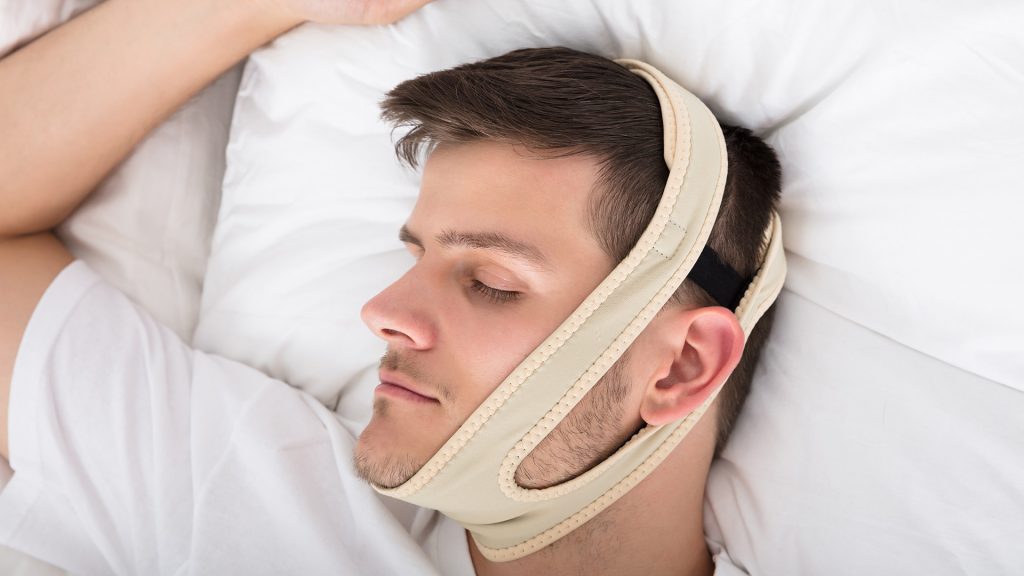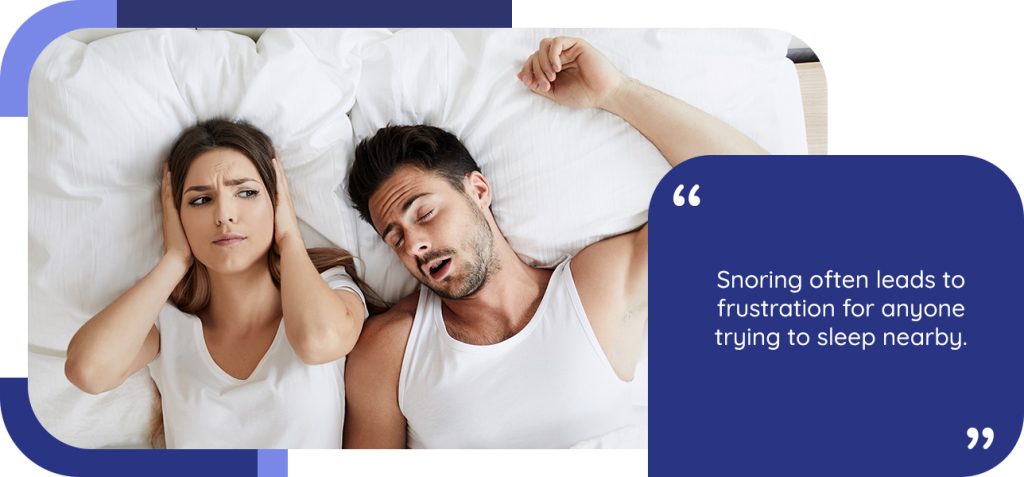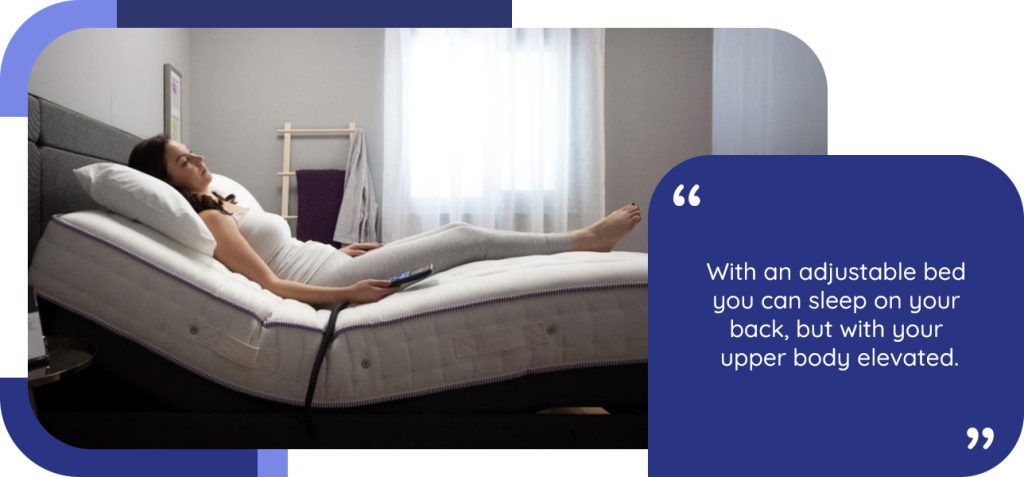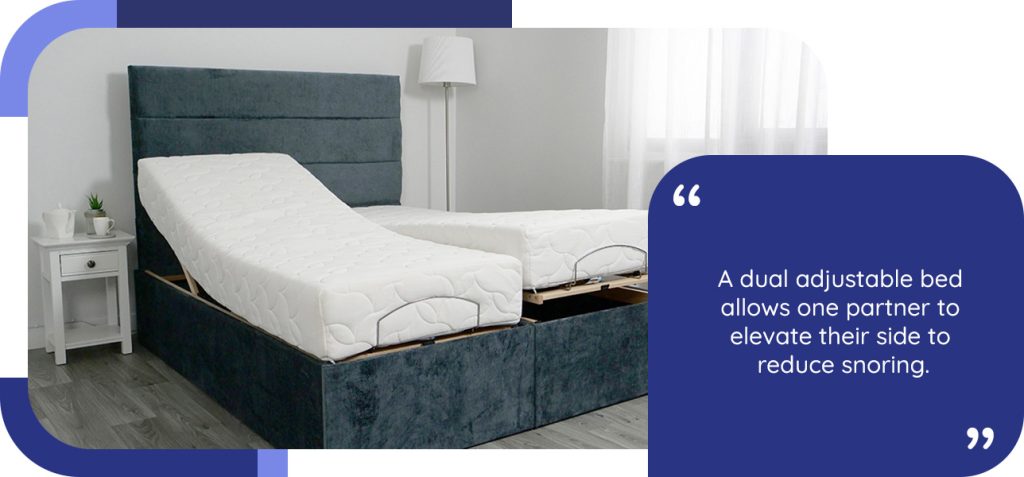How an adjustable bed can help you stop snoring

Snoring affects around 42% of UK adults regularly, making it one of the most common sleep disruptions. While occasional snoring is usually harmless, chronic loud snoring can significantly impact sleep quality for both you and your partner.
If you’ve tried various remedies without success, an adjustable bed might be the solution you’ve been looking for. By allowing you to sleep in an elevated position, adjustable beds can address many of the root causes of snoring, helping you achieve quieter, more restful nights.
Table of contents
1. Why do people snore?
Snoring occurs when air cannot move freely through your nose and throat during sleep, causing the surrounding tissues to vibrate and produce that familiar rattling sound. The noise levels can sometimes reach very high decibels, leading to frustration for anyone trying to sleep nearby and potentially forcing couples to consider sleeping in separate rooms.
Several factors contribute to snoring:
- Sleeping on your back: When you lie flat, gravity makes your relaxed tongue and throat tissues more likely to sag backward and partially block your airway. This is why snoring often worsens in the face-up position. You may have noticed how someone snoring loudly often quiets down when nudged to roll onto their side.
- Overly relaxed throat muscles: During sleep, the muscles in your tongue and throat naturally relax. In some people, they relax too much, causing the tongue or soft palate to droop into the airway. This partial blockage leads to vibrations as air tries to pass through.
- Nasal congestion or blockages: If your nasal passages are congested due to a cold, allergies, or structural issues like a deviated septum, you’ll be forced to breathe through your mouth, which can trigger snoring.
- Being overweight: Carrying extra weight, especially around the neck, puts pressure on throat tissues when you lie down. This narrows the airway and makes snoring more likely. Weight gain is one of the biggest risk factors for snoring, though losing weight often leads to noticeable improvements.
- Alcohol or sedatives before bed: Drinking alcohol in the evening or taking certain sleep medications can exaggerate snoring by relaxing throat muscles more than usual, making the airway floppier and more prone to obstruction.
- Smoking and irritants: Smoking tobacco irritates the lining of your nose and throat, causing swelling and excess mucus that narrows your airways. Research shows smokers are twice as likely to snore compared to non-smokers.

2. Is it snoring or sleep apnoea?
If you snore heavily and experience gasping, choking, or pauses in breathing during the night, you might be dealing with more than simple snoring. Obstructive sleep apnoea (OSA) is a serious sleep disorder where throat muscles temporarily collapse and completely block the airway, causing you to stop breathing for brief moments. Your brain then awakens you (often without full awareness) so normal breathing can resume, usually with a loud gasp or snort.
Key signs of sleep apnoea include:
- Very loud, chronic snoring punctuated by periods of silence
- Gasping or choking sounds during sleep
- Excessive daytime sleepiness or morning headaches
- Your partner notices you stop breathing momentarily while asleep
If you have these symptoms, it’s important to consult your GP. Sleep apnoea can strain your heart and increase the risk of serious health issues like high blood pressure, heart attack, or stroke if left untreated. The NHS advises seeing a doctor if your snoring affects your life or if you show signs of OSA.
While occasional snoring that improves with simple changes is usually nothing to worry about, suspected sleep apnoea requires medical attention. Effective treatments like CPAP machines or oral devices can be life changing.
3. Can an adjustable bed help reduce snoring?
Many people struggling with snoring have found relief by adjusting their sleeping position, and this is exactly where adjustable beds excel. An adjustable bed allows you to raise or lower different parts of the mattress at the touch of a button, helping you find a posture that keeps your airway more open throughout the night.
Health professionals often recommend that snorers sleep slightly propped up instead of completely flat. Raising your head by even a few inches can help prevent your tongue and throat tissues from collapsing into the airway. Traditionally, people achieve this with multiple pillows or foam wedges. However, pillows can shift or go flat during the night, and stacking them too high might bend your neck at an awkward angle, which isn’t ideal for your spine or comfort.
An adjustable bed offers a clear advantage by smoothly elevating the head section without the hassle of sliding pillows. The elevation is adjustable to whatever height feels most comfortable, and unlike a stack of pillows, an adjustable bed supports your back and neck in natural alignment as you sleep.
Research supports this approach. A clinical study found that when participants slept with their bed inclined by just 12 degrees, they experienced a 7% reduction in snoring duration, 4% fewer awakenings, and a 5% increase in deep sleep time.
4. Four ways adjustable beds can reduce snoring
Adjustable beds offer unique benefits that directly address the causes of snoring:
Benefit 1: Keeps your head elevated for easier breathing
By sleeping with your head and upper body slightly elevated, you reduce pressure on your throat. Even a modest incline can prevent your tongue from slipping back to block your windpipe. Keeping your head raised also encourages nasal passages to drain more effectively, helping keep your nose clear.
An adjustable bed makes this easy—you can modify your sleeping position by lifting the head section to just the right angle that stops your snoring without straining your neck.
Benefit 2: Supports a neutral spine
Many people try to stop snoring by propping themselves upright with pillows, but sleeping on a tall stack of pillows can bend your neck forward awkwardly, pushing your chin toward your chest. This poor posture can make breathing more difficult and may lead to neck or back pain overnight.
In contrast, an adjustable bed keeps your spine in neutral alignment while still raising your upper body. By contouring to the natural “S” curve of your spine, the bed supports your neck and back so you can breathe freely and comfortably. Because an adjustable bed elevates you gently from the hips upward, your airway stays open without your lower back coming out of alignment.

Benefit 3: Lets you sleep on your back more safely
For some people, side sleeping isn’t comfortable due to shoulder or hip pain. Unfortunately, back-sleeping on a flat mattress is notorious for causing snoring, since gravity pulls relaxed throat tissues backwards.
An adjustable bed offers a compromise: you can continue sleeping on your back but with your upper body elevated enough to protect your airway. The bed essentially mimics a recliner position where your head and chest are propped up, reducing airway collapse even when lying on your back. If back-sleeping is your preferred or only comfortable option, an adjustable base can allow it without the usual snoring that comes from lying flat.
Benefit 4: Makes side-sleeping more comfortable
Sleeping on your side is often the best natural remedy for snoring because it prevents your tongue and soft palate from sagging straight back into your throat. An adjustable bed can help you stay on your side comfortably through the night by contouring to your body and relieving pressure points on your shoulders and hips. You can also elevate the foot section slightly, which takes pressure off the lower back and makes side-sleeping feel more supported. With a good adjustable bed mattress that distributes your weight evenly, you won’t wake up with aches that might otherwise send you rolling onto your back.
5. Other tips to help stop snoring
While an adjustable bed can significantly improve snoring, it works even better when combined with healthy lifestyle changes:
- Sleep on your side: If you have trouble staying off your back, sleep experts suggest sewing a tennis ball into the back of your pyjama top or using a wedge pillow to make back-sleeping uncomfortable, encouraging you to stay on your side.
- Maintain a healthy weight: Even small weight loss can reduce snoring, as excess weight around the neck compresses the airway. Losing weight is often the first advice doctors give to overweight snorers.
- Avoid alcohol and big meals late at night: Try not to drink alcohol 2-3 hours before bedtime, as it relaxes throat muscles and worsens snoring. Heavy meals close to bedtime can have a similar effect by pushing up on your diaphragm.
- Quit smoking: Stopping smoking reduces inflammation and swelling in your airway, leading to quieter nights. If you need help quitting, talk to your GP about support options.
- Keep nasal passages clear: If nasal congestion is a problem, consider saline nasal sprays, nasal strips, or a humidifier to keep your nose open at night. Breathing easily through your nose means you’re less likely to resort to mouth-breathing and snoring.
- Try anti-snoring devices: Various devices might help, such as mandibular advancement devices (custom mouthpieces fitted by dentists) that hold your jaw forward to keep your airway open, or nasal dilator strips that widen your nostrils.
If snoring is a new or worsening issue, or if lifestyle changes don’t help, see your doctor to rule out underlying conditions. Sometimes treating nasal allergies or swollen tonsils can resolve snoring.
6. Choosing the right adjustable bed
If you’re thinking aboutbuying an adjustable bed to help with snoring, here are key factors to consider:
- Size and base type: Adjustable beds are available in all standard sizes. If you share a bed but have different preferences, a dual adjustable bed with two separate mattresses and mechanisms allows each person to find their perfect position without disturbing the other.
- Mattress compatibility: You’ll need a mattress flexible enough to bend with the moving sections. Memory foam, latex, or specially designed adjustable bed mattresses work well. Adjustamatic’sAirFlow® mattress, for example, is designed specifically for flexibility and support on adjustable bases.
- Features for comfort: Consider extras like built-in massage features. Adjustamatic’sNHC Cyclo-Therapy® massage is an optional feature that can help relax your muscles before sleep. While not a direct snoring remedy, it may improve your overall sleep quality.
- Budget and quality: An adjustable bed is an investment in your health and comfort. Focus on reputable brands with good warranties and support. A cheap adjustable bed might not have a smooth or durable mechanism, which could become frustrating long-term.
Don’t hesitate to try before you buy. Adjustamatic offers free home consultations where they can discuss your needs and demonstrate an adjustable bed in person, ensuring you find the perfect fit.

7. Ready for quieter nights and more restful sleep?
If snoring is disrupting your sleep and affecting your (or your partner’s) quality of life, you’ve now seen how an Adjustamatic adjustable bed can offer a practical and comfortable solution. It’s not just about having a bed that moves; it’s about investing in a clinically-informed approach to better breathing and deeper, more restorative sleep.
Why choose Adjustamatic to help you tackle snoring?
At Adjustamatic, we understand that finding the right solution for snoring goes beyond a simple purchase. It’s about personalised support and technology that truly addresses the underlying positional causes of snoring.
Here’s how we make a difference:
- Precision elevation for open airways: Forget unreliable stacks of pillows. Our adjustable beds allow you to fine-tune the elevation of your upper body with precision, maintaining a consistent angle that helps keep your airway open throughout the night. This gentle incline, which supports your spine correctly, can significantly reduce the vibrations that cause snoring.
- Tailored comfort for undisturbed sleep: Whether you prefer to sleep on your back (with elevation) or find side-sleeping more comfortable, our beds adapt. For those sharing a bed with someone, our dual-control systems mean one partner can elevate their side to reduce snoring, while the other sleeps in their preferred position, ensuring both get a good night’s rest.
- More than just anti-snoring – it’s about holistic sleep health: While elevation is key for snoring, features like our optional NHC Cyclo-Therapy® massage system can help soothe muscle tension and improve circulation, contributing to overall better sleep quality. When you sleep more deeply, you’re less likely to be disturbed by minor airway resistance.
- British craftsmanship and dedicated support: All our adjustable beds are built with care in our UK workshop, reflecting our commitment to quality and durability. Our expert team offers personalised guidance, starting with a free home demonstration where you can experience the benefits firsthand. We’ll help you understand how different positions can alleviate your snoring and find the perfect setup for your needs. We also provide advice on potential VAT exemption for qualifying health conditions.
Take the first step towards peaceful nights
If you’re serious about finding a lasting solution to snoring and improving your overall sleep, let Adjustamatic guide you. Our knowledgeable sleep consultants are ready to provide you with a detailed brochure, discuss your specific snoring concerns, and, if you wish, arrange a complimentary, no-obligation home trial.
Discover how simple adjustments can lead to significant improvements. Call us today free on 0800 689 9823 (lines open 9am-5pm Monday to Friday) or send us a message to request your free brochure. It’s time for you and your loved ones to enjoy the silence of a good night’s sleep.


